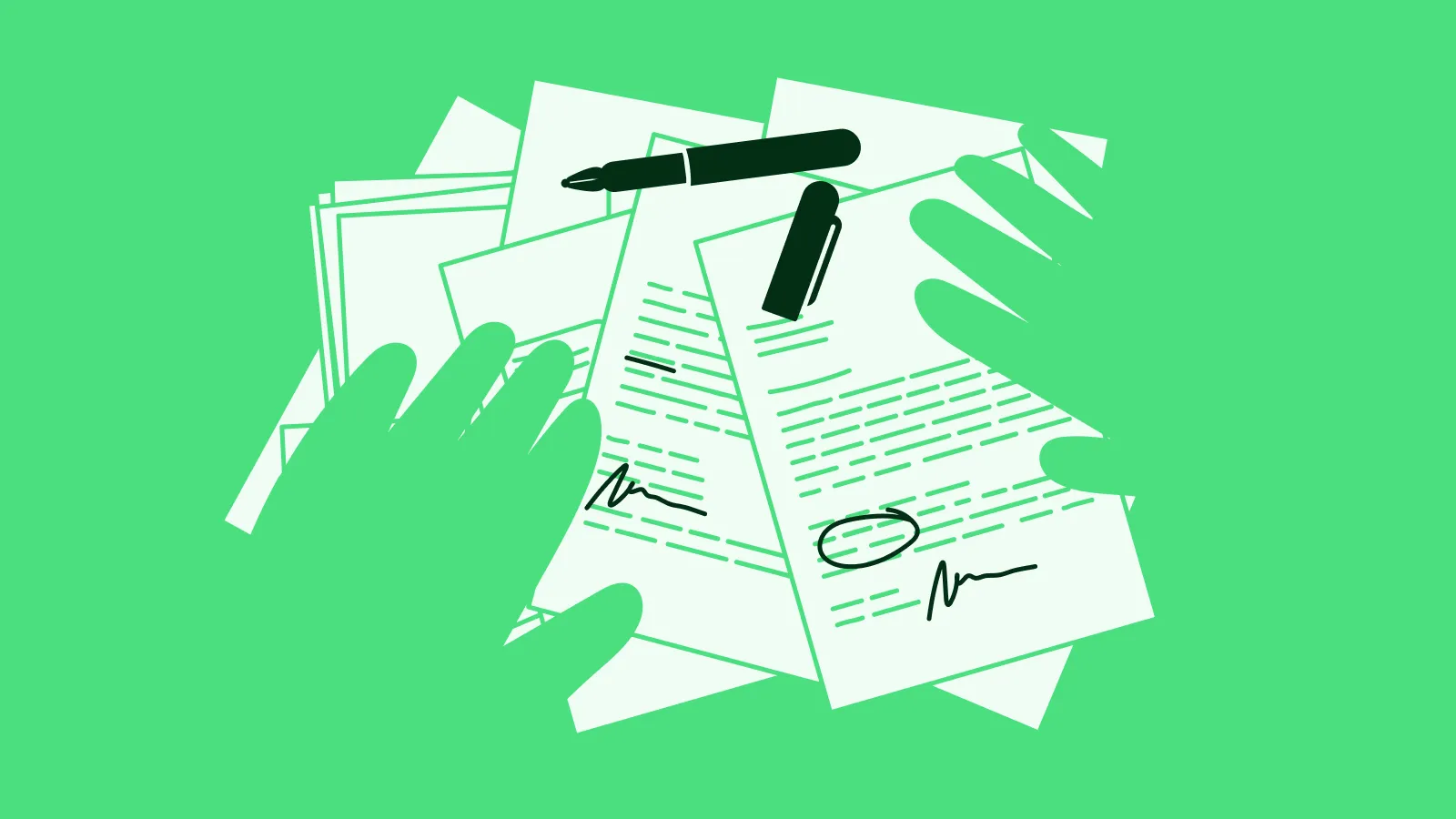What Can Stop You Getting a Mortgage?
We break down all the common barriers and provide a clear, step-by-step guide if your mortgage application is refused.
Your home may be repossessed if you do not keep up repayments on your mortgage.
Exclusive broker partner to

Author: Michael Whitehead, Head of Content
Reviewer: Paul Coss, Haysto Co-Founder and Chief Customer Officer
Updated: Nov 17 2025 8 mins
If your mortgage application has been declined, it’s easy to feel disheartened or think that homeownership is now off the table. But a rejection from one lender simply means their particular criteria didn’t match your situation at that moment. It doesn’t mean the door is closed for good.
The secret to a successful mortgage journey is preparation, know-how, and choosing the right lender. In this guide, we’ll look at the most common barriers that stop people from getting a mortgage in the first place, and then give you a clear, practical roadmap for what to do if you’ve already been refused.
Quick Summary:
The four main barriers: Lenders assess risk based on four key areas: your credit history (e.g., bad credit, too much debt), your income/affordability (e.g., complex or low income), the property itself (e.g., non-standard construction, low valuation), and application mistakes.
AIP is not an offer: An Agreement in Principle (AIP) is only a preliminary estimate; you can still be declined after this point following the hard credit check and valuation.
Investigate the refusal: Your first move is to download your full credit report to identify exactly what went wrong (errors, missed payments, etc.).
Rebuild, don't rush: Don't apply to another high street lender immediately. Spend time repairing your credit and reducing outstanding debts to strengthen your application.
Seek specialist advice: A mainstream lender's rejection often simply means your profile didn't match their criteria. Work with an experienced broker (like us!) who can match your specific situation to a specialist lender designed to handle more complex cases.
What Can Stop You Getting a Mortgage?
Lenders assess risk. They want to be confident that you can comfortably afford your monthly repayments now and into the future. If anything in your financial profile raises a flag about this ability, it can create a barrier to approval.
Here are the most common factors that stop applications from getting approved:
1. Issues with Your Credit History
Your credit history tells lenders how reliable you are at managing borrowed money. That’s why it’s crucial to check your credit report before you apply so you can fix any problems.
Bad credit: Serious marks, such as a recent County Court Judgment (CCJ), an unsatisfied default, or a history of mortgage arrears, are red flags for mainstream lenders. Even minor issues, like a couple of missed utility bill payments, can signal risk.
Too much debt: Lenders look closely at your debt-to-income (DTI) ratio. If your existing monthly loan, credit card, and car finance payments take up too large a percentage of your income, a lender might worry you won’t have enough money left over to handle a mortgage payment, too.
Not on the electoral roll: Something as simple as not being registered to vote can hurt your application. It makes it harder for lenders to confirm your identity and address, which they see as a stability risk.
2. Income and Affordability Concerns
Even if you have a high income, if it’s inconsistent or judged as unstable, a lender might decline your application. They run rigorous affordability assessments to stress-test your finances.
Insufficient income: After deducting all your outgoings, if a lender calculates that your monthly income won’t leave enough of a buffer to cover the mortgage repayments (plus a reserve in case rates rise), they will refuse the loan.
Complex or new income: If you’re self-employed, newly employed, a contractor, or earn income from multiple streams (like bonuses or commission), lenders need to see proof of consistency over time, often two to three years of accounts. If you can’t provide this evidence, or your earnings fluctuate wildly, it can be a problem.
Short employment history: Being new in a job or having just started a probationary period can sometimes be seen as unstable, especially by traditional high-street banks.
3. The Property
It’s not just about you; the home you’re buying also needs to meet the lender’s criteria. The property acts as the security for the loan, so it needs to be fit for purpose.
Low valuation: If the surveyor values the property for less than the price you’ve agreed to pay, the lender will only approve the mortgage based on the lower valuation. If you can’t make up the shortfall, the application will be declined.
Non-standard construction: Properties built using unusual methods or materials (e.g., steel frames, timber construction, or thatched roofs) can be deemed higher risk. Some lenders won't touch them, which can reduce your options.
Structural or environmental issues: If the property survey identifies major structural defects, significant damp, or risks such as high flood exposure, the lender may withdraw their offer until the issues are addressed or if they deem the risk too great.
4. Application Mistakes
Sometimes, the simplest mistakes can lead to an outright rejection from a computer system that’s running checks.
Inaccurate or inconsistent information: If the income details you state on your application don’t exactly match your payslips or bank statements, or if you fail to disclose an outstanding loan, the lender may reject the application for integrity reasons.
Too many applications: Submitting multiple mortgage applications within a short period of time results in a series of 'hard searches' on your credit file. This signals desperation and risk to future lenders, often leading to automatic refusal. Always talk to a broker first!
Can a Mortgage Be Declined Even After an Agreement in Principle?
Yes, absolutely. A Mortgage in Principle (MIP) (also known as an Agreement in Principle (AIP)) is a preliminary estimate. It’s a significant first step, but it’s not a guarantee.
An MIP is often based only on a basic soft credit check and the verbal information you provide. The formal mortgage offer is only issued after the lender has completed all the final checks, which include a comprehensive 'hard' credit search, a detailed review of all your supporting documents, and a property valuation.
If they find anything that doesn't fit their criteria during these final steps, they can, and sometimes will, decline the application.
Why Pick Picnic?
With access to thousands of mortgage products, easy-to-use technology, and 100+ experts, our award-winning service is with you every step of the way.
Your home may be repossessed if you do not keep up repayments on your mortgage.
Steps You Can Take if You’ve Been Refused a Mortgage
Okay, the first step is to take a deep breath! This is a common situation, and it’s fixable. Your next step should NOT be to apply to another lender blindly. That can only make the problem worse.
Here’s your smart, four-step plan to turn a rejection into an approval:
1. Find Out Why You Were Refused
A mortgage lender doesn't have to tell you why they refused your application, but sometimes they will offer a simple reason. If they do, share this information immediately with a mortgage expert (like us!) so we can pinpoint the exact problem.
If the lender provides no reason, the next step is to download your full credit report. This will show you exactly what every lender sees:
Check for errors: Are there any mistakes, incorrect addresses, or debts you’ve already paid off that are still marked as outstanding? Getting these removed can instantly boost your chances.
Identify red flags: Look for defaults, CCJs, or missed payments that may have tipped the balance. The details here are everything—was the defaulted amount high or low? How long ago did it happen? This helps determine which lender to approach next.
2. Repair and Rebuild Your Application
Once you know the reason for the refusal, dedicate time to fixing it. Some positive steps you can take straight away include:
Improve your credit score: Register on the electoral roll. Pay down credit card debt to below 30% of the limit. Make sure all your direct debits and loan payments are made on time, every month.
Reduce other debts: Focus on clearing as many short-term loans, overdrafts, and credit card balances as possible. This lowers your DTI ratio and boosts your overall affordability.
Boost your deposit: The higher your deposit, the lower the loan-to-value (LTV) ratio. A lower LTV means less risk for the lender, which can offset other minor risks, like a small credit hiccup.
Hold off on new credit: Resist the urge to apply for any new credit cards or loans. You want a period of financial stability that shows a lender you are focused on the mortgage and nothing else.
3. Seek Specialist Advice
A rejection usually means you applied to a lender whose criteria were too strict for your specific circumstances. A high street bank might say no to a small CCJ, but a specialist lender is often built to deal with that exact scenario.
Specialist lenders review applications on a case-by-case basis. They’re more likely to look at the 'why' behind a complex income structure or an adverse credit mark, rather than just the score itself.
This is where working with an experienced mortgage broker is vital - like us! We have direct relationships with these lenders and know exactly which one is most likely to approve your application based on your history.
This targeted approach avoids further damaging rejections and saves you huge amounts of time and stress.
4. Reapply with the Right Lender
Once you've made the necessary changes and teamed up with a specialist, your broker will prepare a targeted, clean application for the most suitable lender.
Because our team of mortgage experts understand the market inside out, we can match you to a lender who views your situation—whether it’s self-employment, a credit blip, or a non-standard property—as manageable risk, not an automatic refusal.
This gives you the absolute best chance of moving forward to that final, successful mortgage offer.
Why Pick Picnic?
If you've recently had your mortgage application rejected, or concerned that your case is more complex, finding the right lender on your own could be a challenging and time-consuming process. Having an experienced mortgage broker on your side - like us! - makes things much easier and more efficient.
With access to these types of mortgage products, easy-to-use technology, and 100+ experts, our award-winning service is with you every step of the way. Here’s how we can help:
Finding you the best mortgage deals: Our mortgage team will already know which lenders are currently offering the most competitive rates. They can compare all the current mortgage deals available to find the one that’s right for your circumstances, including exclusive offers not generally available elsewhere.
Your mortgage, made simple from start to finish. Our online portal allows you to track your mortgage application step-by-step, sign and upload documents in seconds, and contact your mortgage team at any time. No back-and-forth emails. No printing. No guesswork. Everything you need, all in one place, so you can stay organised and in control of your mortgage journey.
Making mortgages possible, whatever the circumstances: Our team of advisors have a clear understanding of the eligibility criteria used by each lender and will identify the one that's best placed to help. Our sister brand, Haysto, specialises in helping customers who've been turned away elsewhere. For anyone with a complex income or adverse credit record - we’re here to support you!
Get Your Mortgage Journey Back on Track with Picnic!
A mortgage rejection is a hurdle, not a roadblock. The key is to transform that rejection into a plan: find the specific reason for the decline, dedicate time to rebuilding the weakest areas of your application, and—most importantly—work with an expert who’s been down this road before.
At Picnic, we’re here to keep your journey simple, clear, and on the right path. Our experienced team can assess your profile, identify the best way forward (even if that means introducing you to a specialist lender), and guide you through the process step by step.
Ready to find out which lender is right for you? Make an enquiry today, and let’s make sure your next application is a success!
Frequently Asked Questions
Yes, it’s possible. It depends on the severity, amount, and age of the adverse credit. Minor, satisfied issues from a couple of years ago are much easier to deal with than recent, high-value, unsatisfied debts.
Specialist lenders work with applicants in this exact position every day, so don't assume the high street's 'no' applies everywhere.
A refusal only affects your credit score if it involves a hard credit search. If the refusal occurs after a full application, the hard search remains on your file and can temporarily lower your score, making other lenders cautious.
This is why applying to a second lender without expert advice and guidance is so risky.
If the refusal was due to something simple, like missing paperwork, you can reapply almost immediately. If it was due to affordability or a severe credit issue, it’s smarter to wait 3–6 months while you actively work to repair your credit report and reduce your outstanding debts.
A delay of a few months is preferable to receiving another rejection.
Related Pages
Porting Your Mortgage

The Picnic Guide To Buying a Home

How Conveyancing Works

How Stamp Duty Works

Speak to One of Our Experts
First or next move, remortgaging or investing - get clear advice from our award-winning experts to help you find the right mortgage.
Your home may be repossessed if you do not keep up repayments on your mortgage.